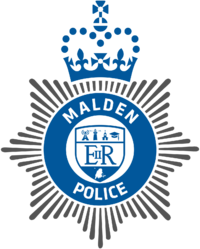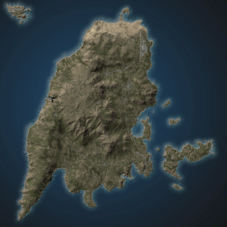Malden Police Service
The Altis Police Service (APS), formerly known as the Altis Police Constabulary (APC) is the territorial police force responsible for law enforcement on Altis, covering an area of 270 km2 with around 230 officers.
| Abbreviation | MPS | |
| Agency overview | ||
|---|---|---|
| Formed | 17th July 2021 | |
| Employees | 100+ in total | |
| 80+ Police officers | ||
| 20+ PCSOs | ||
| Legal personality | Police force | |
| Jurisdictional structure | ||
| Operations jurisdiction |
Malden | |
| Size | 62km2 (24 sq mi) | |
| Population | 54,586 | |
| Jurisdictional structure | ||
| Overviewed by |
|
|
| Headquarters | La Trinite Police Police Station | |
| Agency executives |
|
|
| Facilities | ||
| Stations | 2 | |
| Specialised buildings |
1 | |
| Website | ||
Operational structure
The Altis Police Service is organised into the following directorates:
Police Command
Each is overseen by at least one Deputy Chief Constable and Assistant Chief Constable, the Altis Police Services management comprises of two main structures, Police Command (officers of the ranks Chief Constable, Deputy Chief Constable and Assistant Chief Constable), and the Police Board which is a larger, and intentionally representative group of Police officers, holding senior positions in both Constabularies, Specialist Units or as Constabulary Representatives.
Deputy Chief Constable and Assistant Chief Constable work alongside the three Chief Constable in Police Command, which structure is as follows:
| Chief Constable | ||
|---|---|---|
| Operational Oversight | CC Gremlin | |
| CC Sciencefreak | ||
| TBA | ||
| Deputy Chief Constable | Assistant Chief Constable | |
| Frontline Policing | DCC Snuffles | ACC Mike Hunt & ACC Gregory |
| Specialist Operations | DCC LastNickLeft | ACC TBA |
Frontline Policing
For operational purposes, the Altis Police Service is divided into four geographical divisions known within the service as "constabularies". These mainly represent the main population centres on Altis, (being Kavala, Agios and Athira). Police Academy as of end of 2020 is the only constabulary without a dedicated location.
The four existing divisions with their divisional identifiers and their divisional commander are as follows:
| Identifier | District | Partnership Working Areas | District Commander | District HQ |
|---|---|---|---|---|
| KV | Kavala | "The Square Mile" (Kavala City Centre) | CSI Leon Kennedy | Kavala Police Station |
| AG | Agios | Towns and Cities to the West of Agios (including Agios) | CSI TBA | Agios Police Station |
| AT | Athira | Towns and Cities to the East of Agios (not including Agios) | CSI OneShot | Athira Police Station |
| AC | Police Academy | Responsible for training officers | CSI Scream | Affected by location of trainees |
The service headquarters is located at Kavala Police Station in the Kavala Bay area.
Specialist Operations
- Armed Response (AR) – Responsible for providing armed response and support across the whole of Altis, Armed Response travels in ARVs (Armed Response Vehicles) responding to calls involving firearms, weapons and gangs, which may put a other officers at significant risk. Armed Response is an amalgamation of officers with a higher level of firearms proficiency.
- National Crime Agency (NCA) – Replacing the Narcotics Infringement Unit (NIU), It also assumed a number of responsibilities of other law enforcement agencies and it is Altis' lead agency against organised crime, involving drugs, firearms and gangs. Often in partnerships with constabularies and other specialist units.
- National Police Air Service (NPAS) – Provides centralised air support to the Altis Police Service, based from Kavala Police Station and the National Police Air Service Headquarters located beside the Altis International Airport
- Marine Policing Unit (MPU) – Responsible for policing the Altis coastline and surrounding waters. They utilise a specialised fleet of watercraft to perform maritime operations, based at Kavala Police Station and the Marine Policing Unit Headquarters located beside the Altis International Airport.
- Specialist Protection Group (SPG) – Provides personal armed protection for the Royal family, Prime Minister (Mayor) and other ministers, ambassadors, visiting heads of state and other Very Important Persons (VIPs). The Specialist Protection Group is also responsible for providing armed officers that guard important locations such as Her Majesty's Treasury, 10 Kavala Street and the RBA Reserve. They are responsible for escorting all the aforementioned people and are occasionally involved in prisoner transport. They use vehicles to halt traffic, and use armed cars at the rear of the escort for armed assistance and traffic control. Once the escort has passed, the roads are immediately opened. All SPG officers are armed.
- Road Traffic Unit (RTU) - Responsible for providing fast response across Altis Highways
Ranks
The Altis Police Service uses the standard British Police ranks, indicated by shoulder boards (epaulettes), up to Chief Constable.
Following controversy over various Police Complaints where officers refused to identify themselves by name, and a statement by CC Tadworth in early 2016 that "the public has a right to be able to identify any uniformed officer whilst performing their duty", collar numbers were introduced. They are allocated individually to each officer, who must tell you their collar number except in a small amount of specific circumstances. Every officer (except those that are masked or plain clothed) is required to display their collar number at all times.
- Police Community Support Officer (PCSO): The rank assigned to all newly recruited officers, displayed by a blue epaulette with "PCSO" written on it.
- Probationary Police Constable (Prob. PC): "PPC" written on the epaulette with "Probationary Police Constable", name and collar number also displayed.
- Police Constable (PC): "PC" Written on the epaulette with "Police Constable", name and collar number also displayed. Note that any officer above Police Constable has passed all their initial training as provided by the Police Academy and therefore at this point officers become entirely responsible for their own decision making in relation to the National Decision Model (NDM)
- Sergeant (SGT): Three pointing-down chevrons above the divisional call sign and shoulder number, officers above this rank may have additional powers to authorise specific actions.
- Inspector (INS): Two Order of the Bath stars, informally known as "pips".
- Chief Inspector (CI): Three pips.
- Superintendent (SI): Single crown, this is the first Constabulary Command rank.
- Chief Superintendent (CSI): Single crown over one pip.
- Assistant Chief Constable (ACC): Crossed tipstaves in a bayleaf wreath, this is the first Police Command rank.
- Deputy Chief Constable (DCC): One pip over Assistant Chief Constable's badge.
- Chief Constable (CC): Crown over Commander's badge.
| Training Ranks | Police Officers | Bronze Command (Constabulary Seniors) | Silver Command (Constabulary Command) | Gold Command (Police Command) | |||||||
|---|---|---|---|---|---|---|---|---|---|---|---|
| Police Community Support Officer | Probationary Police Constable | Police Constable | Sergeant | Inspector | Chief Inspector | Superintendent | Chief Superintendent | Assistant Chief Constable | Deputy Chief Constable | Chief Constable | |
| Epaulette | |||||||||||
| Paycheck | £1,831 | £1,940 | £2,106 | £2,341 | £2,657 | £3,066 | £3,580 | £4,211 | £4,970 | £5,871 | £6,925 |
| For a comparison of these ranks with other British police forces see Police Ranks of the United Kingdom | |||||||||||
Police officers are paid according to a uniform pay scale, which increases with each promotion, starting at £1,831 for PCSOs up to £6,925 for CCs.
Joining the Police Service
In order to join, aspiring recruits have to fill out the official Police Application Form on the government website and, once received, applications will be reviewed by the Police Recruitment Team.
It's also possible for ex-members to rejoin the service by approaching one of the senior members of the Recruitment Team.
Resources
Fleet
The Altis Police Service operates and maintains a fleet of various types of vehicles which are used for a range of duties, these include:
- Area Cars: used for patrolling a particular district, and for 999 emergency response, these vehicles are driven by Bronze and Silver Command.
- Incident Response Vehicles (IRV) or Response Cars: used for patrol and 999 emergency response
- Armed Response Vehicles (ARV): used by Armed Response to transport their Authorised Firearms Officers, SFOs and CTSFOs to incidents.
- Traffic Pursuit Vehicles: Used by the Road Traffic Unit to enforce Road Traffic Rules and pursue those who attempt to escape via the roads.
Vehicles
All vehicles listed are used as marked Incident Response Vehicles (IRV) or Armed Response Vehicles (ARV) by the Altis Police.
Incident Response Vehicles (IRV) or Response Cars - (used by Constabularies and Road Traffic Unit):
- SUV
- Hatchback
- Hatchback Sport
- MB 4WD
- Van (Also used for public order situations and mass transportation of officers).
Armed Response Vehicles (ARV) - (used by Armed Response and National Crime Agency):
- SUV
- Hatchback Sport
- Prowler
- Hunter (AR / NCA)
Aircraft - (used by National Police Air Service):
- M-900
- MH-9
- Hellcat
- Taru (Sling, Transport & Bench)
- Blackfish (Infantry & Vehicle Transport Variants)
- Ghosthawk
Watercraft - (used by Marine Policing Unit):
- Water Scooter
- Assault Boat
- Motorboat
- Swimmer Delivery Vehicle (SDV)
- Rigid-Hull Inflatable Boat (RHIB)
- Speedboat Minigun
Miscellaneous Vehicles:
- Hunter (Command)
- SUV (Command/Specialist Protection Group)
- AR-2 Darter (Command/Specialised Units)
- Orca
History
The Altis Police Service was formed on the 14th February 2014, as a method of Policing the island state of Altis.

